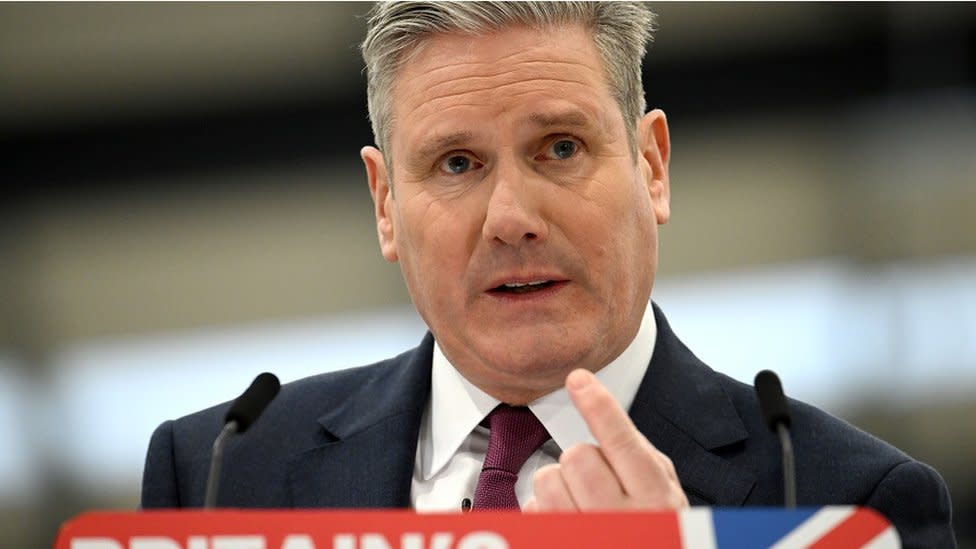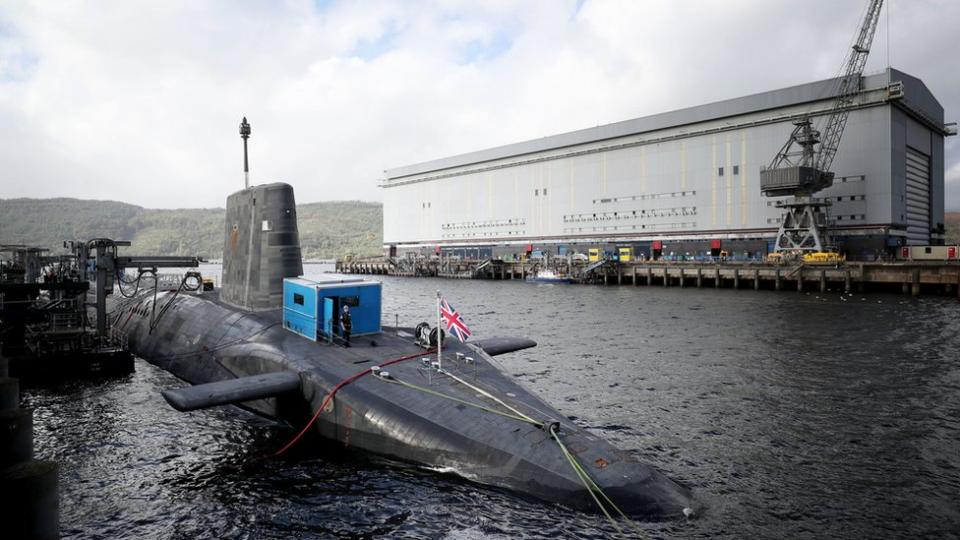Keir Starmer: Labour commitment to nuclear weapons unshakeable

- Oops!Something went wrong.Please try again later.
- Oops!Something went wrong.Please try again later.
- Oops!Something went wrong.Please try again later.
Sir Keir Starmer has said his commitment to the UK's nuclear weapons is "unshakeable" and "absolute".
Writing in the Daily Mail, he described the creation of the NHS and an independent British nuclear programme as "towering achievements" of the Labour government elected in 1945.
The Labour leader has also said he wants to raise defence spending to 2.5% of GDP "as soon as resources allow".
The government plans to spend 2.3% of GDP on defence this year.
Chancellor Jeremy Hunt has also said he wants the figure to rise to 2.5% "as soon as economic conditions allow," but neither party has set out a timeline for this to happen.
Earlier this year, two ministers - Anne-Marie Trevelyan and Tom Tugendhat - publicly urged the government to invest in defence at a "much greater pace".
Defence Secretary Grant Shapps said Labour could not "be trusted with our nation's defences", because the Labour leader and shadow defence secretary John Healey had "tried twice to put Jeremy Corbyn in charge of the nation's armed forces".
"The same man who wanted to scrap our nuclear deterrent, dismantle Nato and questioned the integrity of British intelligence community," Mr Shapps added.
Since the United States dropped atomic bombs on Hiroshima and Nagasaki in 1945, Labour has often been divided on nuclear weapons - and the related issue of multilateral versus unilateral disarmament - not least during the leadership of Sir Keir's predecessor, Jeremy Corbyn.
Clement Attlee, who was prime minister from 1945-1951, is now widely revered in the party as the father of the NHS and much of the rest of the welfare state.
But he was also the father of Britain's nuclear bomb, making sure the UK got its own "nuclear deterrent", committing many millions to its development at a time when the country was technically bankrupt.
His foreign secretary, Ernest Bevin, was a key figure in the establishment of the Nato alliance.
In his Mail article, Sir Keir emphasised these points, calling them a "proud part of my party's heritage".
In an interview with In an interview with the i newspaper, he said he would conduct a strategic review of defence and security "to be clear what the priorities are".
In a statement ahead of a visit to Barrow-in-Furness in Cumbria - where nuclear submarines are made - Sir Keir said Labour's commitment to the UK having nuclear weapons was "total".
The UK's four nuclear-armed Vanguard submarines that carry Trident missiles are housed in the west of Scotland.
"In the face of rising global threats and growing Russian aggression, the UK's nuclear deterrent is the bedrock of Labour's plan to keep Britain safe," said Sir Keir.

"It will ensure vital protection for the UK and our Nato allies in the years ahead, as well as supporting thousands of high-paying jobs across the UK."
He also described his party as one that had "changed" - referring to Mr Corbyn, a long-time opponent of the UK's Trident submarine-based missile system and vice-president of the Campaign for Nuclear Disarmament (CND).
Speaking to the i, Sir Keir said nuclear weapons were "expensive but it's absolutely vital and needed".
Annual running costs are estimated at 6% of the defence budget - about £3bn for 2023-24. The new Dreadnought boats being built at Barrow-in-Furness to replace the current submarines in the early 2030s carry an estimated cost of £31bn.
Asked about defence spending, Sir Keir told the paper: "Obviously we want to get to 2.5% as soon as resources allow that to happen.
"That was the position when Labour left government and we absolutely stand by our commitment to Nato."
Liberal Democrat leader Sir Ed Davey attacked both Labour and the Conservatives for offering "only meaningless talk about vague aspirations for some unspecified time in the future".
"With Putin waging war in Europe and Trump threatening the future of NATO", his party would reverse "the Conservatives' irresponsible cuts to Army troop numbers", he said.
SNP defence spokesperson Martin Docherty-Hughes MP - whose party does not support Trident - said Westminster had "already wasted billions of pounds of taxpayers' money on nuclear weapons".
He added it was "grotesque that Sir Keir Starmer is prepared to throw billions more down the drain when his party claim there is no money to improve our NHS, help families with the cost of living or to properly invest in our green energy future".
Defence union Prospect said all parties should pledge to spend 2.5% of GDP on defence.
General secretary Mike Clancy said: "We have a world-leading workforce in the defence sector, which delivers jobs and growth for communities up and down the country."
All members of military alliance Nato have pledged to spend at least 2% of the value of their economies - measured by GDP - on defence per year by 2024.
According to the Nato secretary general's annual report in March, Poland was the top spender, allocating 3.9% of its GDP (the total value of goods and services produced), which was more than twice the amount it had spent in 2022.
The US was in second place at 3.2%.

